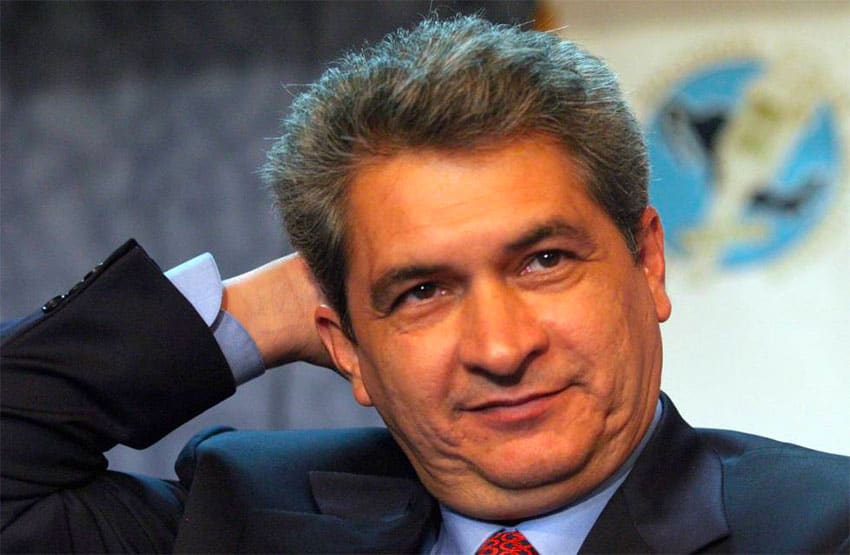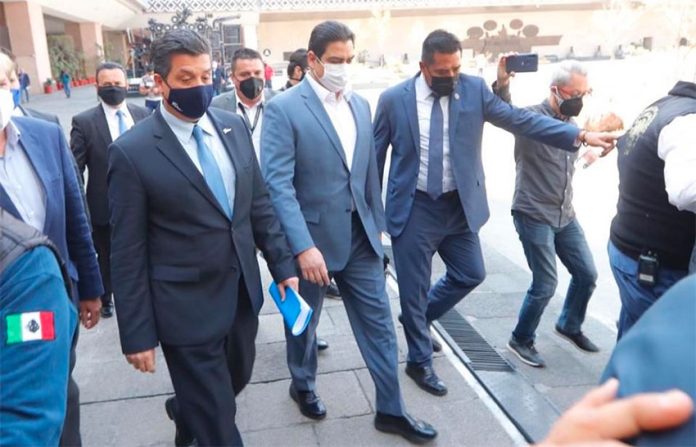Tamaulipas Governor Francisco García Cabeza de Vaca, accused by federal authorities of ties to organized crime, illicit enrichment and tax fraud, has links to the Gulf Cartel dating back to 2004, according to testimony included in an application to Congress to strip the governor of his legal immunity.
Obtained by the newspaper Milenio, the 90-page application submitted to Congress by the federal Attorney General’s Office (FGR) includes testimony from Antonio Peña Argüelles, a businessman who confessed to being a money launderer for former Tamaulipas governor Tomás Yarrington, currently imprisoned in the United States awaiting trial on drug trafficking and laundering charges.
Peña, sentenced in the United States in 2014 to 2 1/2 years in jail for money laundering and drug trafficking, testified in a federal court in Texas that Yarrington, governor from 1999 to 2004, told him to request Gulf Cartel resources to support García’s campaign to become mayor of Reynosa.
Peña said that Yarrington had a “special interest” in García winning the Reynosa mayoral election, which was held in November 2004.
García did indeed win and served as mayor of the border city between 2005 and 2007. Five years later he entered federal Congress as a National Action Party (PAN) senator and remained in that role until early 2016. García became governor of Tamaulipas in October of that year.
According to other information in the application to strip the governor of his legal protection, García, as mayor of Reynosa, gave permission to the Gulf Cartel to hold a Children’s Day event at a baseball stadium in the border city in 2006.
According to media reports, almost 20,000 people attended the event at which children were given toys and cards signed by former Gulf Cartel leader Osiel Cárdenas Guillén, currently serving a 25-year prison term in the United States.
The FGR application for desafuero, as the immunity-stripping process is known, also includes an email sent anonymously to federal authorities from a hotmail account that claims that García has assets in the United States worth 951 million pesos (about US $46 million).
The email states that the García Cabeza de Vaca family owns 30 properties in Texas including company premises, restaurants, art galleries, homes and ranches. The email describes the real estate portfolio as a collection of “hidden assets” in the south of the Lone Star state, which borders Tamaulipas.
An investigation conducted by the federal government’s Financial Intelligence Unit (UIF) implicates García’s wife, mother, brother – current PAN Senator Ismael García Cabeza de Vaca – and his brother’s wife in criminal activities that allegedly allowed the governor to accumulate riches far greater than the wealth afforded to him as a result of his salary.
A UIF file included in the desafuero application says that the governor declared income of just under 6.7 million pesos (US $323,000) in 2019 but in fact received bank deposits totaling more than 42.9 million pesos (US $2.1 million). The Finance Ministry, of which the UIF is part, noted that there is a stark disparity between the income García declared to authorities and the money he received via bank deposits.

The governor allegedly received more than 42.9 million pesos in 10 deposits between May and December of 2019 and made 162 transfers to move almost 26.7 million pesos in an apparent attempt to hide the funds’ illicit origin.
The UIF said that there is “sufficient evidence to infer that these resources are the product of one or several crimes.”
García traveled to Mexico City on Wednesday and went to the lower house of Congress to seek further information about the accusations he faces. He claimed that the allegations against him are “the product of a political persecution” directed from the National Palace, the seat of executive power and President López Obrador’s residence.
“If there is any crime I have committed it’s probably the fact that I haven’t submitted to this federal government,” the governor told a press conference.
In a documented submitted to the lower house of Congress, which is expected to consider the desafuero application on Thursday, García claimed that his right to due process, appropriate legal defense and the presumption of innocence have all been violated.
The governor also said that the accusations against him are unfounded and that he has been kept in the dark about their details, asserting that the FGR has blocked his attempts to find out more about the allegations he faces.
“It constitutes a serious violation of my human rights to due process, appropriate defense and presumption of innocence …” the document said.
In his press conference, García claimed that federal government officials are “very annoyed” with him for exposing a fabricated document the Federal Electricity Commission used to back up its claim that a wildfire in Tamaulipas contributed to a massive power outage last December.
He also charged that the government is annoyed with him for being one of the founders of the Federalist Alliance, a coalition of governors opposed to López Obrador and his administration, and for defending the renewable energy industry, which is under attack by the president.
López Obrador on Wednesday asserted for the second time in two days that there is no “political persecution” of the Tamaulipas governor. He said that it will be up to the lower house of Congress to decide whether García should be prosecuted.
“It’s a very transparent and open process, we have to wait and not add more things that should be recorded in the complaint that the Attorney General’s Office presented,” he said.
Source: Milenio (sp)
